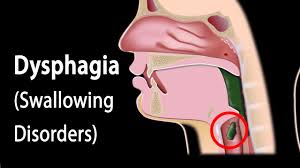
Diagnosed with Cancer? Your two greatest challenges are understanding cancer and understanding possible side effects from chemo and radiation. Knowledge is Power!
Learn about conventional, complementary, and integrative therapies.
Dealing with treatment side effects? Learn about evidence-based therapies to alleviate your symptoms.
Click the orange button to the right to learn more.
- You are here:
- Home »
- Blog »
- side effects ID and prevention »
- Dysphagia (Difficulty Swallowing) No More?
Dysphagia (Difficulty Swallowing) No More?

Radiation to my fifth cervical vertebra (bottom of my neck) caused my swallowing muscles to slowly weaken aka a side effect called dysphasia. Though the study linked and excerpted below focuses on oral cancers, I have a blood cancer called multiple myeloma.
The focus of this post is the radiation-induced side effect called dysphasia, not the cancer itself.
In all of my previously written blog posts focusing on dysphagia, I never questioned the cause of the side effect. It never occurred to me that the dose of radiation received by the cancer patient could be reduced therefore minimizing this difficult adverse event. Duh…
Time after time research confirms that cancer patients live longer and experience fewer side effects with lower doses of chemotherapy and radiation.
Experience has taught me that conventional oncology focuses ONLY on treatment and length of life at the expense of quality of life-
- Healing Radiation-induced Dysphagia- Difficulty Swallowing
- Anticipate,Treat Difficulty Swallowing- Dysphagia
- Myeloma – Dysphagia aka Difficulty Swallowing
- Got Cancer? Chemotherapy is toxic- less is more
- PeopleBeatingCancer- Side Effects Program
I thought that I had stabilized my dysphagia by developing a daily routine of neck exercises. Unfortunately, over the past 6-8 months or so I’ve begun experiencing some of the symptoms of aspiration discussed below.
I’ve actually felt a bit of food or drink almost being sucked into my lungs. I’ve gagged once or twice on something I’ve been eating. The bottom line is that I have to exercise my neck muscles more and eat more carefully.
Do you have difficulty swallowing? Did you receive radiation to your neck? What type of cancer do you have? Scroll down the page, post a question or a comment and I will reply to you ASAP.
Hang in there,
David Emerson
- Cancer Survivor
- Cancer Coach
- Director PeopleBeatingCancer
Dysphagia-optimised intensity-modulated radiotherapy versus standard intensity-modulated radiotherapy in patients with head and neck cancer (DARS): a phase 3, multicentre, randomised, controlled trial
“Most newly diagnosed oropharyngeal and hypopharyngeal cancers are treated with chemoradiotherapy with curative intent but at the consequence of adverse effects on quality of life…
Interpretation- Our findings suggest that DO-IMRT (dysphagia-optimised intensity-modulated radiotherapy) improves patient-reported swallowing function compared with standard IMRT.
Cancers of the pharynx are common…For most newly diagnosed patients, radiotherapy or chemoradiotherapy is the treatment of choice. These treatments are curative for the majority of patients but have adverse effects on quality of life.
Evidence before this study- We searched PubMed… No randomised studies were identified. Two small series of patients treated with dysphagia-optimised radiotherapy were found. The literature showed that poor swallowing outcomes affect most patients with head and neck cancer in the long-term after radiotherapy.
Observational data suggest that the radiation dose delivered to the muscles of the pharynx during radiotherapy for head and neck cancer was related to swallowing function after treatment, with lower doses being associated with better swallowing outcomes…
Dysphagia, Aspiration and Stricture
“What is it?
Dysphagia refers to difficulty swallowing. While dysphagia can have many causes, often it results from scar tissue formation contributing to a narrowing in the throat or esophagus. Such a narrowing is called a ‘stricture’. Patients who experience dysphagia may also experience ‘aspiration’ which is a condition where food, fluid or saliva unintentionally leaks into the windpipe…
How is the condition treated?
For patients treated with radiation or a combination of chemotherapy and radiation therapy, studies have shown that continuing to use the muscles and to stimulate the tissues of the throat during treatment results in improved swallowing function…”

